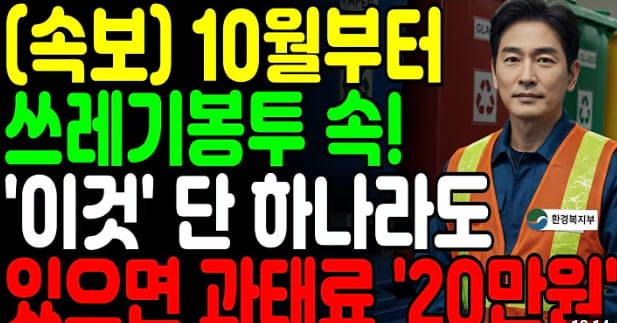Listen to the article
The Korean Ministry of Environment has forcefully rejected spreading rumors about hefty fines for improper waste separation, calling the claims “completely false information.”
Officials responded this week to viral social media posts that alleged residents would face fines of up to 3 million won (approximately $2,200) for failing to properly separate recyclables from general waste. The ministry clarified that no such penalty system exists for individual households under current regulations.
“These claims have absolutely no basis in fact and are causing unnecessary public concern,” a ministry spokesperson said. “Current waste management laws do not include provisions for fining individual households over waste separation practices.”
The rumors appear to have originated from misinterpretations of existing commercial waste regulations. While businesses and apartment complexes managed by professional services do face penalties for improper waste disposal, these fines are directed at corporate entities and building management companies, not individual residents.
South Korea has developed one of the world’s most advanced waste management systems over the past two decades, with recycling rates consistently among the highest globally. The country’s waste separation system is notably thorough, requiring citizens to sort trash into multiple categories including paper, plastic, metal, glass, food waste, and general garbage.
Environmental experts point to this system as a key factor in South Korea’s successful reduction of landfill use by over 60% since 2000. The country now recycles approximately 60% of municipal waste, compared to an OECD average of around 35%.
“The Korean waste management model is actually built on public cooperation rather than punitive measures,” said Dr. Kim Jae-hyun, an environmental policy researcher at Seoul National University. “Education and accessibility of recycling facilities have proven far more effective than fines would be.”
The ministry emphasized that while proper waste separation remains important for environmental sustainability, the government focuses on incentives and awareness campaigns rather than household penalties to maintain compliance.
“Our approach has always been to make recycling convenient and to help citizens understand the environmental benefits,” the spokesperson added. “The current system works because people participate voluntarily, not because they fear punishment.”
The false information spread particularly quickly through messaging platforms popular among older Koreans, prompting the ministry to launch a targeted awareness campaign to counter the misinformation. Officials have distributed fact sheets to community centers and local government offices frequented by senior citizens who may be less likely to see corrections online.
Waste management has taken on increased significance in South Korea since China’s 2018 ban on foreign waste imports, which forced the country to process more of its recyclables domestically. This policy shift led to improvements in processing infrastructure but also highlighted the importance of proper waste separation at the source.
The ministry also noted that South Korea’s “pay-as-you-throw” system, which requires residents to purchase designated bags for non-recyclable waste, already provides a financial incentive for proper recycling. Under this system, introduced in 1995, recyclable materials can be disposed of without cost, while general waste requires purchased bags that vary in price depending on local jurisdictions.
“This existing system gently encourages proper waste handling without resorting to punitive fines,” explained Park Sun-mi, an official from the ministry’s Resource Circulation Bureau. “It’s been remarkably effective at changing behavior over time.”
Environmental advocates welcomed the ministry’s clarification while emphasizing the continued importance of proper waste management practices.
“While there are no fines for individuals, we should remember that improper waste separation creates real environmental and economic costs for everyone,” said Lee Min-ho of the Korean Federation for Environmental Movement. “Participation in recycling remains a civic responsibility even without legal penalties.”
The ministry has urged citizens to verify information through official channels before sharing potential misinformation on social media platforms.
Verify This Yourself
Use these professional tools to fact-check and investigate claims independently
Reverse Image Search
Check if this image has been used elsewhere or in different contexts
Ask Our AI About This Claim
Get instant answers with web-powered AI analysis
Related Fact-Checks
See what other fact-checkers have said about similar claims
Want More Verification Tools?
Access our full suite of professional disinformation monitoring and investigation tools




8 Comments
Interesting to see how South Korea has evolved its waste management over the past couple decades. I wonder what lessons or best practices could be shared with other countries working to improve their own recycling and disposal systems.
Glad the ministry acted quickly to dispel these rumors. Spreading misinformation can undermine public trust, so it’s important they provided a clear, factual response. Looking forward to seeing continued improvements in Korea’s waste policies.
Good to see the climate ministry taking these rumors seriously and providing a clear, factual rebuttal. Maintaining public trust is crucial when it comes to environmental policies and regulations.
I’m curious to learn more about South Korea’s approach to waste management and recycling. It sounds like they’ve made good progress in developing an effective system, though there’s always room for improvement when it comes to environmental issues.
Seems like a misunderstanding of the regulations, which target commercial entities rather than individual households. South Korea’s waste management system is indeed quite advanced, so it’s reassuring they are clarifying the actual policies.
Good to see the climate ministry promptly addressing and debunking these false claims about waste separation fines. It’s important to provide accurate information and avoid causing unnecessary public concern.
The ministry’s swift response to refute these false claims is commendable. Spreading misinformation, even unintentionally, can sow confusion and undermine public confidence. Kudos to them for setting the record straight.
It’s understandable why these claims about hefty fines would cause concern among the public. But I’m glad the ministry was able to clarify that the regulations don’t actually target individual households in that way. Transparency is key.